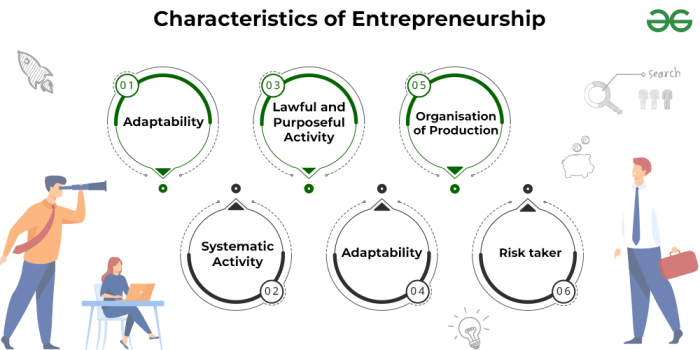Entrepreneurship Tips: Dive into the world of business with these essential tips that will elevate your entrepreneurial journey to new heights. From generating innovative business ideas to mastering financial management, this guide has got you covered. Get ready to unleash your potential and turn your dreams into reality!
Whether you’re a budding entrepreneur or a seasoned business owner looking to take your venture to the next level, this comprehensive overview will equip you with the knowledge and strategies needed to thrive in the competitive business landscape. Let’s explore the key pillars of entrepreneurship and unlock the secrets to building a successful business from the ground up.
Overview of Entrepreneurship Tips

Entrepreneurship is the process of starting and running a business, taking on financial risks in the hope of profit. It involves innovation, creativity, and a strong drive to succeed in the competitive business world.Effective entrepreneurship tips are crucial for guiding aspiring entrepreneurs in navigating the challenges and uncertainties of starting and managing a business. These tips offer valuable insights, strategies, and advice that can help entrepreneurs make informed decisions, overcome obstacles, and maximize their chances of success.
Importance of Entrepreneurship Tips
- Provide valuable insights and guidance for aspiring entrepreneurs.
- Help in developing essential skills and knowledge needed to run a successful business.
- Offer strategies to overcome challenges and setbacks in the entrepreneurial journey.
- Enable entrepreneurs to make informed decisions and seize opportunities for growth.
- Empower individuals to turn their innovative ideas into profitable ventures.
Developing a Business Idea
When it comes to entrepreneurship, developing a solid business idea is the first step towards building a successful venture. Here are some key strategies to consider:
Generating Innovative Business Ideas
- Brainstorming sessions with a diverse group of individuals can spark creativity and lead to unique ideas.
- Identify problems or gaps in the market that your business can address with a new solution.
- Stay updated on industry trends and technologies to identify opportunities for innovation.
- Experiment with different concepts and be open to feedback and iteration.
Validating a Business Idea’s Feasibility, Entrepreneurship Tips
- Conduct market research to assess the demand for your product or service.
- Create a prototype or minimum viable product to test the concept with potential customers.
- Seek feedback from industry experts, mentors, and target customers to validate the viability of your idea.
Significance of Market Research
Market research plays a crucial role in shaping a business idea by providing valuable insights into consumer preferences, competitor landscape, and overall market dynamics. By conducting thorough market research, entrepreneurs can make informed decisions and tailor their business ideas to meet the needs of their target audience effectively.
Building a Strong Business Plan

Creating a business plan is crucial for the success of any venture. It serves as a roadmap for your business and helps you stay focused on your goals. Here are some essential components of a comprehensive business plan:
Key Components of a Business Plan
- Executive Summary: A concise overview of your business idea, goals, and how you plan to achieve them.
- Business Description: Detailed information about your company, including your mission, vision, and values.
- Market Analysis: Research on your target market, competitors, and industry trends.
- Organization and Management: Artikel of your business structure, key team members, and their roles.
- Products or Services: Description of what you offer, including pricing and unique selling points.
- Sales and Marketing Strategy: Plans for reaching and attracting customers to your business.
- Financial Projections: Revenue forecasts, budget, and funding requirements.
Creating a Compelling Executive Summary
An executive summary is a critical part of your business plan, as it is the first thing investors or stakeholders will read. To make it compelling, focus on the following points:
- Clearly articulate your business idea and value proposition.
- Highlight the market opportunity and why your business is uniquely positioned to succeed.
- Showcase your team’s expertise and key milestones achieved so far.
- Include financial projections and funding requirements to demonstrate growth potential.
Setting Achievable Goals and Milestones
In your business plan, it’s essential to set specific, measurable, achievable, relevant, and time-bound (SMART) goals. This helps you track progress and stay on course. Here’s how to do it:
- Break down your long-term goals into smaller, manageable milestones.
- Assign responsibilities and deadlines for each milestone to ensure accountability.
- Regularly review and adjust your goals based on market feedback and performance data.
- Celebrate achievements and learn from setbacks to continuously improve your business plan.
Financial Management Tips
When it comes to running a successful business, managing your finances effectively is crucial. Here are some tips to help you navigate the financial aspects of entrepreneurship:
Importance of Budgeting and Financial Forecasting
One of the key elements of financial management is budgeting. By creating and sticking to a budget, you can track your expenses, control costs, and ensure that you have enough resources to cover your business needs. Financial forecasting, on the other hand, involves predicting future financial outcomes based on past data and trends. This helps you make informed decisions and plan for any potential financial challenges that may arise.
Securing Funding for a New Business Venture
- Consider bootstrapping: Start small and use your own savings or resources to fund your business initially. This allows you to maintain full control over your venture and avoid taking on unnecessary debt.
- Seek out investors: Pitch your business idea to potential investors who are willing to provide financial support in exchange for equity or a return on investment. Make sure to have a solid business plan and financial projections to back up your request for funding.
- Explore small business loans: Look into different loan options available for small businesses, such as SBA loans or alternative lenders. Compare interest rates, terms, and conditions to find the best financing option for your specific needs.
- Crowdfunding: Utilize online platforms to raise funds from a large number of people who believe in your business idea. Offer incentives or rewards to attract backers and generate buzz around your venture.
Marketing Strategies for Entrepreneurs: Entrepreneurship Tips
In today’s competitive business landscape, effective marketing strategies can make or break a startup. Entrepreneurs need to be strategic and creative in promoting their products or services to stand out from the crowd and attract customers. Let’s delve into various marketing techniques suitable for startups and how branding, unique value propositions, social media, and digital marketing play a crucial role in business growth.
Branding and Unique Value Proposition
Branding is more than just a logo or color scheme; it’s about creating a strong identity that resonates with your target audience. A unique value proposition sets your business apart from competitors by highlighting what makes your products or services special. To establish a memorable brand, entrepreneurs should focus on consistency, authenticity, and emotional connection with customers.
Social Media and Digital Marketing
Utilizing social media platforms like Facebook, Instagram, and Twitter can be a cost-effective way to reach a broader audience and engage with potential customers. Entrepreneurs should craft compelling content, run targeted ads, and interact with followers to build brand awareness and drive sales. Additionally, investing in digital marketing strategies such as , email marketing, and influencer partnerships can boost online visibility and customer acquisition.




